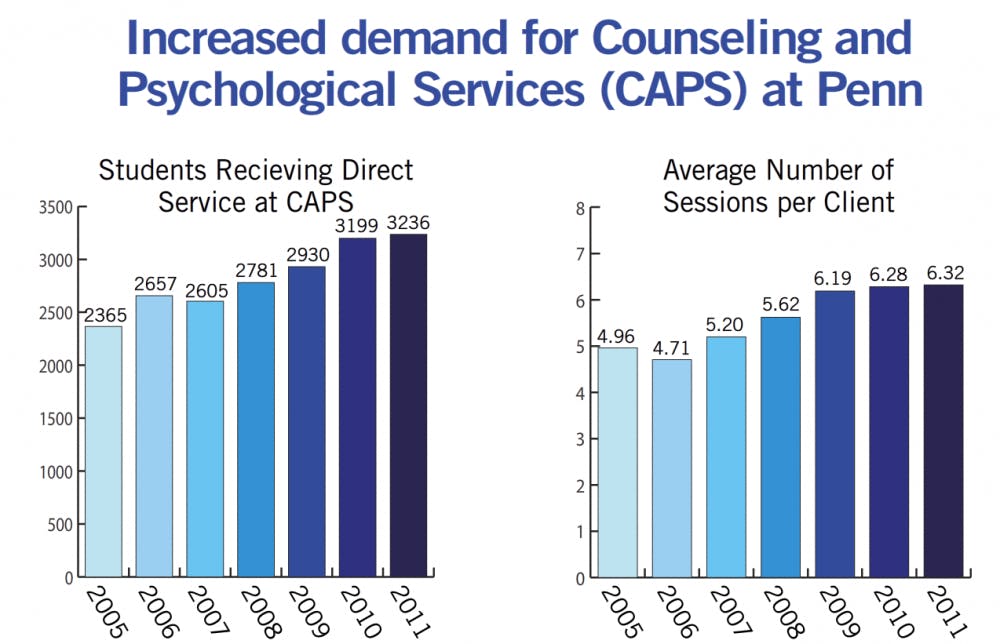As Penn prepares its annual budget for the upcoming fiscal year, the rise in demand for mental health services has raised questions about funding and staffing for Counseling and Psychological Services.
Following a presentation by CAPS Director William Alexander, the University Council discussed the program’s future plans and challenges at a meeting on Jan. 25.
In Fiscal Year 2011 — which ended June 30, 2011 — 3,236 students sought services from CAPS, a jump from 3,199 in FY 10 and 2,930 in FY 09, according to Alexander.
The FY 2011 total comprised about 13 percent of Penn’s population, Alexander added.
“There’s an increased need because people are more comfortable talking about non-crisis issues,” College senior and University Council member Victor Galli said. “You don’t have to be in a crisis situation to go to CAPS — you can go in to talk about what’s on your mind.”
CAPS currently has 22 full-time psychologists, social workers and psychiatrists on its staff, as well as 10 full-time trainees. Approximately 20 percent of students who seek CAPS services are referred to outside providers annually, Alexander said.
While a new budget has not yet been allocated for CAPS, the Office of the Vice Provost for University Life is looking at “data on presenting conditions; number of clients per week that psychologists, psychiatrists, social workers and trainees can see; and historic and cyclic utilization” for the purpose of “predicting need [and] modeling varied staffing patterns,” Associate Vice Provost Max King wrote in an email.
Wharton sophomore and University Council member Nikita Anand asked the Council to discuss CAPS because a number of close friends spoke to her about their negative experiences with the service.
“It requires a lot of work and scheduling [to get help at CAPS] and is a burden to the person seeking help,” Anand said. “Another huge issue is the sense of urgency with scheduling a follow up. If somebody really does need help … constant support for that person would be the best way to alleviate whatever stress they’re under.”
Anand recalled that, one time, a close friend was not contacted with a follow up after her CAPS appointment.
“CAPS does an excellent job of putting themselves out there and marketing during New Student Orientation … to get someone to come for the first time,” Anand said. “I think they should focus on feedback and following up and retaining people who are there already.”
In order to deal with the rising demand for services, CAPS has introduced a triage and referral system to prioritize patients according to the severity of their symptoms, King wrote. CAPS also brings in temporary staff and holds stress-management workshops when demand for resources is at its peak.
Galli, who went to CAPS for eight months earlier in his college career, added that CAPS is “more than willing to listen and take any constructive criticism that is given to them.”
However, students unsatisfied with CAPS services have questioned the effectiveness of the system.
A sophomore — who wished to remain anonymous due to the sensitive nature of the issue — explained that when she experienced anxiety during her first semester at Penn, she was unable to schedule an appointment for a month.
When she was ultimately able to go in, “they just asked background questions and didn’t even get to what brought [her] here,” she said.
After visiting the CAPS office again while struggling with demanding summer session classes, the sophomore said she was told she would have to wait two weeks to see a clinician.
“I was not going to hurt myself, but it was still a pretty extreme situation for me,” she said. “By the time I got that appointment, I was literally leaving for home the next day.”
The sophomore felt that the clinician spent most of the appointment discussing her eating issues rather than addressing her schoolwork-related anxiety.
“It wasn’t a very proactive approach to dealing with the problem — I don’t think we even identified a problem,” she said.
Alexander acknowledged that long wait times are an issue for CAPS, but “it’s not true that you can’t get seen.”
A clinician speaks by phone with every student who calls CAPS in order to “decide if [he or she needs] to come in today or if [he or she] can wait five days or two weeks,” he said.
“Last year was the peak year when the number of our staff outstretched its ability to meet with students,” Alexander added. “The University is really aware of that this year. They are reviewing the staffing at CAPS … It’s likely that this fiscal year, it could be remedied.”



